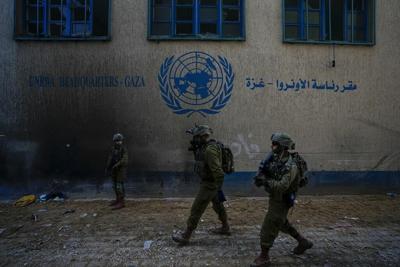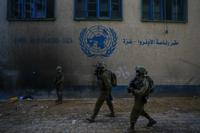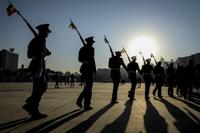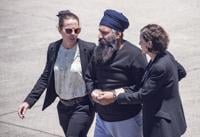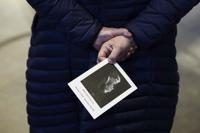JERUSALEM (AP) — Israeli legislation cutting ties with the U.N. agency for Palestinian refugees raised fears that the largest provider of aid to Gaza could be shut out of the war-ravaged territory, even as the implications of the new laws remained unclear Tuesday.
The agency known as UNRWA provides essential services to millions of Palestinians across the Middle East and has underpinned aid efforts in Gaza throughout the Israel-Hamas war. Legislation barring it from operating in Israel Monday. Israel says UNRWA has allowed itself to be infiltrated by Hamas, with the militants siphoning off aid and using the agency’s facilities as shields. UNRWA denies the allegations, saying it is committed to neutrality and acts quickly to address any wrongdoing by its staff.
The two newly passed laws in Gaza and the occupied West Bank, as Israel controls access to both territories. But the details of how the legislation would be implemented, and potential workarounds, remain unclear. It could also face legal challenges.
Either way, the laws could have major consequences for Palestinians in Gaza, who are heavily reliant on emergency food aid more than a year into a war that has killed tens of thousands, according to local officials who don't distinguish combatants from civilians; displaced 90% of the population of 2.3 million; and left much of the territory in ruins.
What do the laws say?
The first law prohibits UNRWA from “operating any mission, providing any service or conducting any activity, either directly or indirectly, within Israel’s sovereign territory,” according to a statement from parliament.
It's unclear whether UNRWA would still be able to operate inside Gaza and the West Bank, territories Israel captured in the 1967 Mideast war but has never formally annexed. The Palestinians want both to be part of a future state.
The second law prohibits Israeli state agencies from communicating with UNRWA and revokes an agreement dating to 1947, before Israel was created, under which it facilitated UNRWA’s work.
With Israel controlling all access to Gaza and the West Bank, it could be difficult for UNRWA staff to enter and leave the territories through Israeli checkpoints, and to bring in vital supplies for its schools, health centers and humanitarian programs.
UNRWA and its staff would also lose their tax exemptions and legal immunities.
How would the laws affect UNRWA’s operations?
UNRWA’s headquarters are in east Jerusalem, which Israel seized in the 1967 war and annexed in a move not recognized internationally.
Much of the agency’s supply lines to the territories run through Israel, and shutting them down could create even more obstacles to getting essential aid — everything from flour and canned vegetables to winter blankets and mattresses — into Gaza.
At present, all shipments of aid into Gaza must be coordinated with COGAT, the Israeli military body in charge of civilian affairs, which inspects all shipments. Aid groups say their work is already hampered by Israeli delays, ongoing fighting and the breakdown of law and order inside Gaza.
Aid levels plunged in the first half of October as Israel closed crossings into north Gaza, where hunger experts say the . COGAT attributed the decline to closures related to the Jewish holidays and troop movements for .
In the first 19 days of October, the U.N. says, 704 trucks of aid entered the Gaza Strip, down from over 3,018 trucks in September and August. COGAT’s own tracking dashboard shows aid deliveries in October plunging to under a third of their September and August levels.
The new laws would also likely bar UNRWA from banking in Israel, raising questions about how it would continue to pay thousands of Palestinian staff in Gaza and the West Bank. Its international staff would likely have to relocate to third countries like Jordan.
What could replace UNRWA?
Rights groups say Israel is obliged under international law to provide for the basic needs of people in the territories it occupies. Israel also faces which says it may have to reduce U.S. military support if there isn’t a dramatic increase in aid going into Gaza.
State Department spokesman Matthew Miller said the United States was “deeply troubled” by the legislation, which “poses risks for millions of Palestinians who rely on UNRWA for essential services.”
“We are going to engage with the government of Israel in the days ahead about how they plan to implement it” and see whether there are any legal challenges, he said.
Prime Minister Benjamin Netanyahu said in a statement Monday that Israel is“ready to work with our international partners to ensure Israel continues to facilitate humanitarian aid to civilians in Gaza in a way that does not threaten Israel’s security.”
But many of those partners insist there is no alternative to UNRWA.
A spokesperson for the U.N. children’s agency, which also provides aid to Gaza, denounced the new laws in unusually strong language, saying "a new way has been found to kill children.”
James Elder said the loss of UNRWA “would likely see the collapse of the humanitarian system in Gaza.” His agency, known as UNICEF, “would become effectively unable to distribute lifesaving supplies,” such as vaccines, winter clothes, water and food to combat malnutrition.
Israeli officials are considering the possibility of having the military or private contractors take over aid distribution, but have yet to develop a concrete plan, according to two officials who spoke on condition of anonymity to discuss the closed-door discussions.
COGAT referred all questions on the new legislation to the government.
At risk is not just UNRWA’s aid delivery to Gaza, where it is also the largest employer. UNRWA also operates schools in the occupied West Bank serving over 330,000 children, as well as health care centers and infrastructure projects.
Amy Pope — head of the International Organization for Migration, another U.N. body — said it would not be able to fill the gap left by UNRWA, which she described as “absolutely essential.”
“They provide education. They provide health care. They provide some of the most basic needs, for people who have been living there for decades,” she said.

